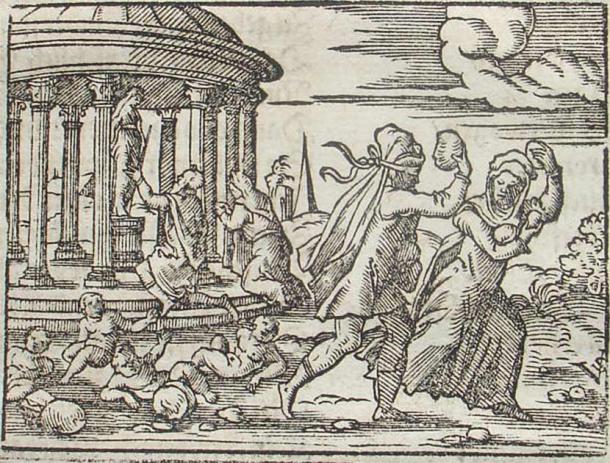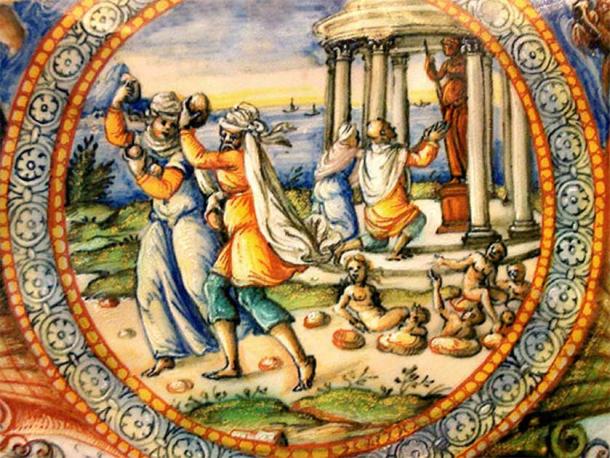Deucalion was the son of the last Titan (god), Prometheus. According to Hesiod, Prometheus and the god Zeus were in conflict. Prometheus was the one who, with the help of the Goddess Athena, created humans. When humankind became mean, greedy, and disobedient to the gods, Zeus decided to destroy them.
Deucalion, son of Prometheus, in an effort to control the animal instincts of humankind asked Zeus to be merciful. Yet Zeus had already decided to destroy the corrupted generation of humankind. Only Deucalion and his wife Pyrrha – both of whom were considered by the ranks of the gods the most righteous amongst humans – were saved, when Deucalion took advice from his father, Prometheus, and constructed an ark.

Deucalion and Pyrrha from a 1562 version of Ovid’s Metamorphoses. ( Public Domain )
He and his wife used the ark to escape the flood sent by Zeus. The rain and thunders lasted for nine days and nine nights, and the land was flooded, drowning the generation of humans except for a few who were saved by running on the top of the mountains. Once the flood was over, Deucalion and Pyrrha landed on a mount (some suggest that it was Mount Parnasus) and offered sacrifices to Zeus. The myth says that once they saw the extent of the destruction, their grief was so great that the tears kept pouring from their eyes.

Deucalion from Promptuarium Iconum Insigniorum ( Public Domain )
Their wish was to create a new humankind. Deucalion and Pyrrha prayed in many different sanctuaries for a new humankind. It was at the temple of the goddess and oracle Themis that Zeus listened to their petitions and their request was granted.
The goddess told them that for a new humankind to be created, Deucalion and Pyrrha had to cover their eyes and throw the ‘bones of their mother’ behind them. What exactly the ‘bones of their mother meant’ is not clear, however the most common interpretation is that it meant stones from the Earth. Each stone that Deucalion threw became a man, and each stone Pyrrha threw became a woman. This is how the new human race, known as the Deukalionids, was created.

Pyrrha and Deucalion, by Oraza Fontana. ( vroma.org)
Crossover with other Creation Myths
It is worth noting here that Deucalion and Pyrrha weren’t the only ones to survive the cataclysm, just like in the Sumerian Myths .
It is important to make a few observations:
a) The story has several similarities with other flood myths, including the Christian and Sumerian Myths .
b) One of the reasons that ‘gods’ were angry with humankind was disobedience, a commonality among the various myths.
c) The new generation of humans is created in a different way than the previous one, perhaps explaining the difference in life span between the new generation and the old ones.
d) Creating the new humankind required Deucalion and Pyrrha to close their eyes, as if they shouldn’t watch the process of creation. Is that similar to the destruction of Sodom and Gomora when they were requested by God not to look back and see what is happening?
e) Complete obedience to the gods resulted in benefits.
Top image: Pyrrha and Deucalion by Giovanni Benedetto Castiglione, 1655. Source: Public Domain
By John Black
Related posts:
Views: 0
 RSS Feed
RSS Feed

















 April 2nd, 2022
April 2nd, 2022  Awake Goy
Awake Goy  Posted in
Posted in  Tags:
Tags: 
















